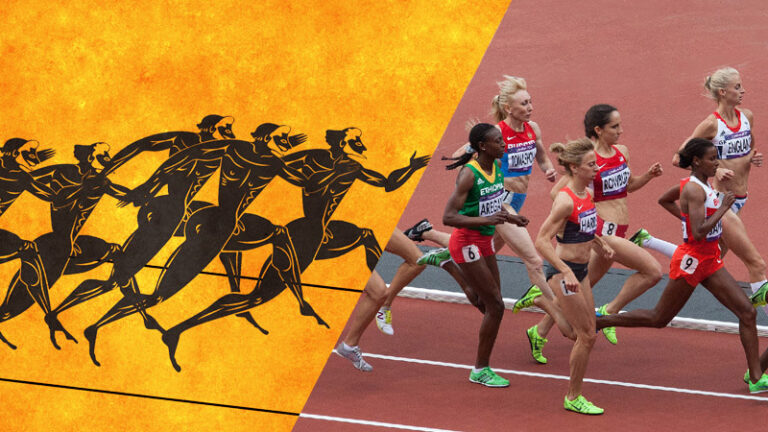
Ancient Greek Olympics
The ancient Olympic games were, as they are today, quite a happening. People came from far and wide to participate in the games or watch the athletes.
The ancient Olympic games began in 776 B.C. and continued until 393 A.D. Just as they have in the modern Olympics, ancient Olympic sports changed and expanded over time. Sports in ancient Greece were a critical part of the culture, and the prominence of the Olympic games is the clearest sign of that. The ancient Olympic games were also a part of a cycle of sporting events, including games at Corinth, Delphi and Nemea. By the height of the games, they were a five day festival of ancient Greek sports, with three days devoted to competition.
How Ancient Greeks Knew of the Olympics
Runners were sent to every part of the country in the year in which the games would take place in order to let everyone in Ancient Greece know of the Olympics. These heralds, as they were called, announced a scared truce for one month of the year. This event was the forerunner of the carrying of the torch, which takes place as a prelude to the modern Olympics.
The Trip to Olympia
Many ancient Greek men of wealth made the journey to see the ancient Olympic sports played live. The city of Olympia was a religious center, and the games began as a way to honor the gods of ancient Greece. Olympia is easy to reach by ship, and athletes and spectators traveled from as far away as Spain, the Black Sea and Egypt. An international truce was declared for a month before the games to allow people to travel to Olympia for to participate in or watch ancient Olympic sports. If you were traveling to the games, you likely had a long, but not terribly dangerous journey before you. Married women were not allowed to attend, even as a spectator; however, young unmarried women could attend. The trip itself was costly; however, athletes might well have been sponsored by a wealthy individual. In order to participate in ancient Olympic sports, you had to be a young man, Greek or from a Greek colony, and capable of speaking Greek and born free. Furthermore, you had to swear before a statue of Zeus that you had trained for ten months. Just like modern competitors, ancient Greek athletes had to train at Olympia for a month prior to the games.
The Site of the Ancient Greece Olympics
Olympia was the site of the Olympics of Ancient Greece, because it was a natural amphitheater situated among the wooded slopes and plains of the region between the Alpheus and Claudius Rivers. It was also conveniently located, so it was possible to reach this site by ship, allowing participants to come here from faraway locations. The Olympics was a time of peace for Ancient Greece, as there was a truce declared a month before to allow all participants to travel safely to Olympia. Any city that broke this truce could be fined by having all their athletes banned from the competition.
Olympia was the site of a religious festival held in Ancient Greece. It was here that the Olympics first started as part of a religious ceremony in which the ancient Greeks paid homage to Zeus and fallen heroes. Prayer and sacrificial offerings preceded the events of the games.
A Day at the Games
While in 776 B.C., at the first games, the only ancient Greek sport was the stadion race, a variety of other games were added in later years. By the height of the ancient Olympics, a large number of sports in ancient Greece were introduced, including chariot racing, boxing, wrestling, javelin and discus throwing. Many spectators, save the very wealthy, simply slept under the stars. The very rich brought tents and even servants along to make sure they were comfortable while watching the array of ancient Greek sports. Merchants and craftspeople of all sorts sold everything from food to souvenir items at the ancient Olympic games, and some of these souvenirs exist even today. Spectators would have spent time not only watching ancient Greek sports, but also in religious rituals of various sorts and even watching other performances, including poetry and rhetoric.
The Winners of the Ancient Olympic Sports
Competitors had to be free born to participate in the Olympic games, which exempted slaves from taking part in the games. There were separate competitions for men and boys. Youths were placed in divisions for the competition depending on their age, strength, and physical size. Although women were not permitted to take part in actual physical competitions, they were permitted to take part in equestrian events. However, a woman had to be an owner of a chariot team or a horse in order to compete in these events.
Sports in ancient Greece were an important part of the overall culture, and the athlete, nude and in top physical condition, personified this. Athletes competed in a variety of sports, ranging from simple foot races to violent boxing matches, complete with leather gloves weighted with metal. While most events were closed to women, who could participate in their own athletic competitions, women could participate in equestrian events as the owner of a chariot or horse at the ancient Olympic games.
Judges for the competitions of the Ancient Greek Olympics were all chosen from one place – Ellis. This was because Olympia was part of the region of Ellis. Cheating was not permitted under any circumstances. A competitor caught cheating was fined.
At the end of the games, there was a full day long banquet, consisting of 100 oxen that had been sacrificed to Zeus. In ancient Greece, sports were about more than who won, but also a competition in honor of the gods. Winners were awarded an olive branch or crown of olive leaves, and often returned home to considerable honors, including gifts of money from their city. Sculptors might well sculpt them, and they would have earned fame with their victory in ancient Greek sports. They also had the right to have their sculpture placed in Olympia.
Sports in ancient Greece were a part of daily life for many people, and the Ancient Greek Olympic games were an important cultural event every four years. They were, moreover, quite a party with rituals, vendors, poetry and a huge crowd on the Olympic grounds in Olympia, Greece.

